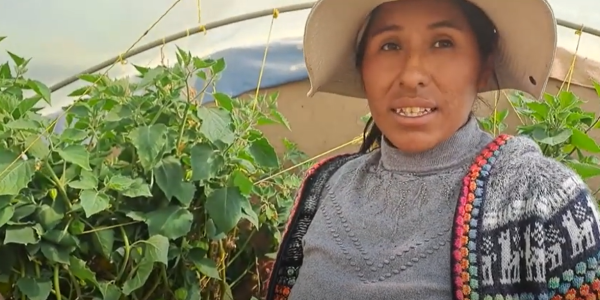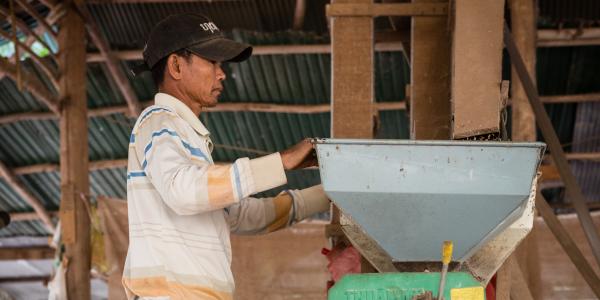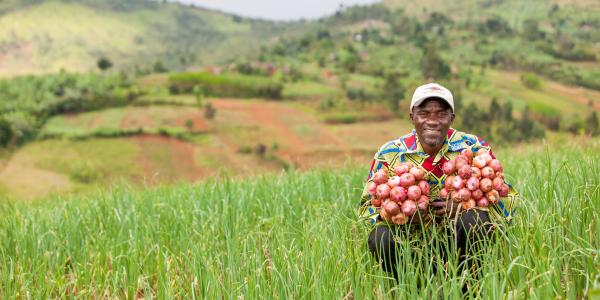
Agroecology
What is Agroecology?
Agroecology is a agriculture technique that combines ecological principles and agricultural practices to create sustainable and resilient farming systems.
In contrast to conventional agriculture, which often relies on chemical inputs and intensive practices, agroecology aims to work with nature rather than against it. This includes promoting biodiversity, managing soil sustainably and involving local communities in decision-making.
As a holistic approach, agroecology not only improves food production, but also seeks to strengthen the resilience of farming systems to climate change and promote fair and just farming practices.
In a world where sustainability is becoming increasingly crucial, agroecology offers a promising way forward for agriculture.
To harness the positive impact of agroecology, Louvain Coopération is actively involved in several agroecological projects around the world, providing sustainable solutions to local agricultural challenges.
Agroecology encompasses a variety of practices and techniques that aim to create more sustainable and resilient farming systems. These methods are designed to work in harmony with nature, maximising the use of local resources and minimising chemical inputs.
Cover crops and crop rotation
Cover crops are planted to protect and enrich soils between main crop cycles. They help prevent erosion, increase soil organic matter, and suppress weeds. Crop rotation involves alternating crop types on the same plot of land in sequence. This reduces disease and pests, and improves soil fertility by diversifying the nutrients used and returned to the soil.
For example, in Madagascar, to help farmers cope with the climate crisis that hits the island a little harder every year, Louvain Coopération is working to conserve soil by planting ground cover and diversifying crops through market gardening.
Agroforestry
Agroforestry integrates trees and shrubs into farming systems. This practice has many benefits, such as improving biodiversity, sequestering carbon, protecting against erosion and providing additional products (fruit, wood, etc.). In the Democratic Republic of Congo, for example, Louvain Coopération supports agroforestry projects that help farmers diversify their sources of income while improving the resilience of their farming systems to climate change.
Integrated Pest Management
Integrated Pest Management (IPM) combines biological, mechanical and chemical control techniques to manage pest populations in a sustainable way. This includes the use of natural predators, traps and physical barriers, as well as the targeted application of pesticides where necessary. This approach reduces reliance on chemical pesticides and minimises their environmental impact.
For example, in Benin, Louvain Coopération teaches cassava farmers how to control pests using environmentally friendly methods.
Soil and Water Conservation
Techniques such as terraces, retention ditches and contour dams are used to conserve soil and water in sloping agricultural areas. These practices help prevent erosion and improve water infiltration, which is crucial for maintaining soil fertility and ensuring water is available for crops.
In 2020, Louvain Coopération set up a water management project around the Huacata basin in San Lorenzo. The objectives of this action were to improve hydrological cycles, preserve the available water flow and reduce the risk of erosion around the dam. As part of the programme, the water distribution pipe was also repaired for consumption by families in the community.
Use of Renewable Energy
Agroecology encourages the use of renewable energy sources, such as solar, wind and hydro power, to reduce dependence on fossil fuels. For example, in some projects in Africa, Louvain Coopération has installed solar pumps for irrigation, saving energy and reducing costs for farmers. Many projects led by IngénieuxSud aim to create renewable energy solutions for communities.
Integrating Biodiversity
Biodiversity is at the heart of agroecology. By diversifying crop species and integrating natural habitats, farmers can create more resilient and productive ecosystems. This approach also promotes pollination and the natural control of pests. Louvain Coopération supports projects that integrate native plants and polycultural cultivation practices to enhance biodiversity and improve agricultural yields. It also supports the development of beekeeping in several regions.
Agro-ecology offers many benefits, not only for the environment, but also for local societies and economies. These benefits are manifested through sustainable agricultural practices that respect natural cycles and strengthen the resilience of farming systems to climate change.
Environmental benefits
- Improved Soil Health: Agroecological practices, such as the use of cover crops and crop rotation, increase organic matter in soils, improving their fertility and water-holding capacity. This reduces dependence on chemical fertilisers and helps preserve underground biodiversity.
- Water Conservation: Agroecology promotes water management techniques that minimise waste and maximise efficiency. Practices such as water retention systems and drip irrigation enable more efficient use of this precious resource.
- Reducing Greenhouse Gas Emissions: By promoting the use of renewable energy sources and reducing reliance on chemical inputs, agroecology helps to reduce greenhouse gas emissions. In addition, practices such as agroforestry help to sequester carbon in soils and biomass.
Social benefits
- Food security: Agroecology improves food security by increasing crop diversity and stabilising yields. Farmers can produce a wider range of nutritious foods, contributing to a more balanced diet for local communities.
- Community Strengthening:Agro-ecological projects often involve strong community participation. This strengthens social ties and creates a sense of ownership and shared responsibility. Louvain Coopération's initiatives in Benin, for example, have mobilised local communities to work together to implement sustainable farming practices.
- Education and Awareness: Agroecology also includes educational programmes that raise awareness of sustainable practices among farmers and communities. These programmes strengthen local skills and promote more environmentally friendly lifestyles.
Economic benefits
- Reducing Production Costs:By reducing the use of costly inputs such as fertilisers and pesticides, agroecology reduces production costs for farmers. This increases profit margins and makes farms more economically viable.
- Income diversification: Agroecological practices encourage crop and product diversification, enabling farmers to reduce the economic risks associated with market fluctuations and adverse weather conditions. For example, agroforestry and integrated livestock farming offer additional sources of income.
- Market Access: Agroecological products, often perceived as more sustainable and of higher quality, can access niche markets that value environmentally friendly practices. This opens up opportunities for farmers to sell their products at higher prices.
Louvain Cooperation Case Studies and Projects
Louvain Coopération collaborates with various local and international partners to promote agroecology. Our initiatives include research projects, training programmes for farmers, and awareness-raising campaigns to encourage the adoption of agroecological practices. Louvain Coopération has implemented several agroecological projects around the world, demonstrating the tangible benefits of these practices.
- Project in Benin: This project aims to promote agroecology to improve food security and climate resilience. The training offered to local farmers has helped to increase agricultural yields while preserving natural resources.
- Initiative in the Democratic Republic of Congo: In the DRC, Louvain Coopération supports sustainable soil and water management programmes, as well as biodiversity conservation practices. These initiatives have improved soil fertility and increased agricultural productivity.
- Programme in Cambodia: In Cambodia, Louvain Coopération's projects focus on the integration of agroforestry and the use of renewable energy sources. These practices have helped to reduce greenhouse gas emissions and diversify sources of income for local farmers.
- Resilience to climate change: Madagascar is particularly affected by climate change and intense periods of drought are becoming increasingly frequent. Louvain Coopération is working with farmers to develop more resilient crops and practices.
Challenges and Opportunities of Agroecology
Agroecology, while having many advantages, also faces several challenges. However, these challenges also represent opportunities for innovation and continuous improvement.
- Financial Challenges:Access to finance for agro-ecological projects can be limited. Farmers and local communities often need financial support to adopt new practices and technologies.
- Supportive Policies: Government and institutional policies may not always adequately support agroecology. It is crucial to advocate for supportive policy frameworks that encourage sustainable practices.
- Knowledge Transfer: Sharing knowledge and best practices is essential for the dissemination of agroecology. Training programmes and support networks play a key role in this process.
- Opportunities for Innovation: The challenges posed by agroecology stimulate innovation. Information technologies, resource management systems and new funding approaches can all help overcome these obstacles.
- Research and Development: Research organisations play a crucial role in the development and dissemination of agroecological practices. They conduct studies to assess the impact of these practices and develop new technologies to improve their effectiveness.
- Training and Education: Educational institutions are increasingly incorporating agroecology into their training programmes. This is helping to train a new generation of farmers and researchers capable of implementing and promoting sustainable agricultural practices.
Agroecology is gaining increasing support worldwide, with initiatives and policies being put in place by international organisations, governments and institutions to promote sustainable farming practices.
International Initiatives
- FAO (Food and Agriculture Organization of the United Nations): The FAO plays a key role in promoting agroecology through its programmes and publications. It actively supports agroecological projects in various countries, providing resources, training and policy frameworks to help farmers adopt sustainable practices.
- The Economic Community of West African States (ECOWAS) has set up a programme to support the transition to agroecology, encouraging the abandonment of Green Revolution practices. This programme is supported by the FAO as part of its Large-Scale Agroecology Promotion Initiative. In Burkina Faso, Mali and Senegal, farmers' organisations are working with their governments to promote agroecology. This promotion includes subsidies for biofertilisers and other natural inputs, replacing synthetic fertilisers.
- Agroecology Europe : This organisation promotes agroecology across Europe by providing information, resources and collaboration platforms for practitioners, researchers and policy makers.
Government Support
- National and Regional Policies: Many governments adopt policies to encourage agroecology. These policies include subsidies for sustainable farming practices, training programmes for farmers, and research and development initiatives. For example, the French government has launched several initiatives to support agroecology as part of its national strategy for sustainable agriculture.
- Local support : At local level, communes and provinces are setting up programmes to encourage agroecological practices. These programmes can include subsidies for local agricultural projects, training for farmers and community awareness initiatives.
Agroecology has its origins in traditional and indigenous farming practices, which incorporate elements of sustainability and respect for nature. From the 1980s onwards, it gained academic and political recognition, becoming a globally recognised field of research and application. Today, agroecology is supported by international organisations such as the FAO (Food and Agriculture Organisation of the United Nations), which actively promotes its adoption through research programmes and training initiatives.
You can get involved by adopting sustainable practices in your garden, supporting local initiatives, or taking part in volunteering projects with organisations like Louvain Coopération.
In contrast to conventional agriculture, which often relies on chemical inputs and intensive practices, agroecology favours sustainable methods that respect the environment.
Agroecology is an inclusive approach that invites everyone to get involved. Whether you're a farmer, researcher, student, or simply interested in sustainable farming practices, there are many ways to get involved.
Adopting Sustainable Practices
- In Your Garden: Adopt agroecological practices in your own garden by using cover crops, practising crop rotation, and incorporating native plants to enhance biodiversity.
- Local: Support local initiatives by purchasing agroecological products and taking part in community training and awareness-raising programmes. Participation in Projects
- Volunteering: Get involved in volunteering projects with organisations like Louvain Coopération. You can contribute your expertise and energy to support agroecological initiatives in different parts of the world.
- Research and Innovation: Take part in research and innovation projects to develop new agroecological practices and technologies. Collaborate with research institutions and universities to advance the science of agroecology.
Financial Support
- Donations and Funding: Support agroecological projects financially by making donations to organisations like Louvain Coopération. Your contributions can help fund training for farmers, provide necessary equipment and develop new sustainable initiatives.
- Grants and Scholarships: If you are in a position of influence, encourage grant and scholarship policies for agro-ecological projects. This can include grants for farmers, scholarships for students and funding for innovative research.
The principles of agroecology provide a roadmap for creating sustainable farming systems. These principles include:
- Diversity: Encouraging crop and species diversity to improve the resilience of farming systems.
- Recycling: Maximising the use of local resources, recycling nutrients and reducing waste.
- Efficiency: Make efficient use of natural resources, such as water and solar energy.
- Resilience: Improving the ability of agricultural systems to withstand disruption and adapt to climate change.
- Soil health:Maintain and improve long-term soil fertility.
- Social equity:Promote fair farming practices that benefit all stakeholders, particularly local communities.
These principles are put into practice through various Louvain Coopération projects, such as the initiative to promote sustainable agricultural practices, where training in agroecology is offered to local farmers to improve food security and climate resilience.
Agro-ecology offers environmental, social and economic benefits, such as improving soil health, creating jobs and increasing resilience to climate change.
The principles of agroecology include crop diversification, sustainable soil management, biodiversity conservation, and the involvement of local communities in decision-making.
Agroecology is an integrated approach to the management of agricultural ecosystems, aiming to harmonise food production with the preservation of the environment.
Agroforestry is an agricultural practice that integrates trees and shrubs into crop and livestock systems. This approach aims to create more diversified, resilient and productive farming systems. Agroforestry offers many benefits, such as improving soil fertility, reducing erosion, sequestering carbon, and providing additional products such as fruit, wood and fodder.
Agroforestry is a key element of agroecology because it uses ecological principles to improve the sustainability and resilience of farming systems. By integrating trees into agricultural systems, agroforestry helps to diversify agricultural ecosystems, increase biodiversity, and improve ecosystem services. In this way, agroforestry is an agro-ecological practice that plays a crucial role in promoting sustainable and resilient agricultural systems.
Agroecology and permaculture are two sustainable farming approaches that share common principles, but differ in their scope and methods. Agroecology is a scientific discipline and agricultural practice that aims to create sustainable farming systems using ecological principles. It focuses on the research and application of agricultural techniques that improve the sustainability and resilience of farming systems.
Permaculture, on the other hand, is a set of design principles for creating sustainable and resilient human environments. It applies not only to agriculture, but also to architecture, water management, and community planning. Permaculture emphasises the design of integrated and harmonious systems, using techniques such as forest gardens, rainwater harvesting systems, and spiral design. In short, permaculture is broader and encompasses various aspects of sustainability, while agroecology focuses specifically on sustainable farming practices.
Agroecology and organic farming share many objectives and practices, but they are not identical. Organic farming focuses primarily on eliminating chemical inputs (such as pesticides and synthetic fertilisers) and certifying products grown to specific standards. Agroecology, on the other hand, takes a more holistic approach, integrating ecological and social principles into the management of farming systems. It focuses on the sustainability of agricultural ecosystems, resilience in the face of climate change, and the involvement of local communities in decision-making processes. In short, organic farming can be seen as a component of agroecology, but the latter encompasses a wider range of practices and considerations.
Our actions
More videos on the theme +
FAQ
You can get involved by adopting sustainable practices in your garden, supporting local initiatives, or taking part in volunteering projects with organisations like Louvain Coopération.
In contrast to conventional agriculture, which often relies on chemical inputs and intensive practices, agroecology favours sustainable methods that respect the environment.
Agro-ecology offers environmental, social and economic benefits, such as improving soil health, creating jobs and increasing resilience to climate change.
The principles of agroecology include crop diversification, sustainable soil management, biodiversity conservation, and the involvement of local communities in decision-making.
Agroecology is an integrated approach to the management of agricultural ecosystems, aiming to harmonise food production with the preservation of the environment.
Agroforestry is an agricultural practice that integrates trees and shrubs into crop and livestock systems. This approach aims to create more diversified, resilient and productive farming systems. Agroforestry offers many benefits, such as improving soil fertility, reducing erosion, sequestering carbon, and providing additional products such as fruit, wood and fodder.
Agroforestry is a key element of agroecology because it uses ecological principles to improve the sustainability and resilience of farming systems. By integrating trees into agricultural systems, agroforestry helps to diversify agricultural ecosystems, increase biodiversity, and improve ecosystem services. In this way, agroforestry is an agro-ecological practice that plays a crucial role in promoting sustainable and resilient agricultural systems.
Agroecology and permaculture are two sustainable farming approaches that share common principles, but differ in their scope and methods. Agroecology is a scientific discipline and agricultural practice that aims to create sustainable farming systems using ecological principles. It focuses on the research and application of agricultural techniques that improve the sustainability and resilience of farming systems.
Permaculture, on the other hand, is a set of design principles for creating sustainable and resilient human environments. It applies not only to agriculture, but also to architecture, water management, and community planning. Permaculture emphasises the design of integrated and harmonious systems, using techniques such as forest gardens, rainwater harvesting systems, and spiral design. In short, permaculture is broader and encompasses various aspects of sustainability, while agroecology focuses specifically on sustainable farming practices.
Agroecology and organic farming share many objectives and practices, but they are not identical. Organic farming focuses primarily on eliminating chemical inputs (such as pesticides and synthetic fertilisers) and certifying products grown to specific standards. Agroecology, on the other hand, takes a more holistic approach, integrating ecological and social principles into the management of farming systems. It focuses on the sustainability of agricultural ecosystems, resilience in the face of climate change, and the involvement of local communities in decision-making processes. In short, organic farming can be seen as a component of agroecology, but the latter encompasses a wider range of practices and considerations.



